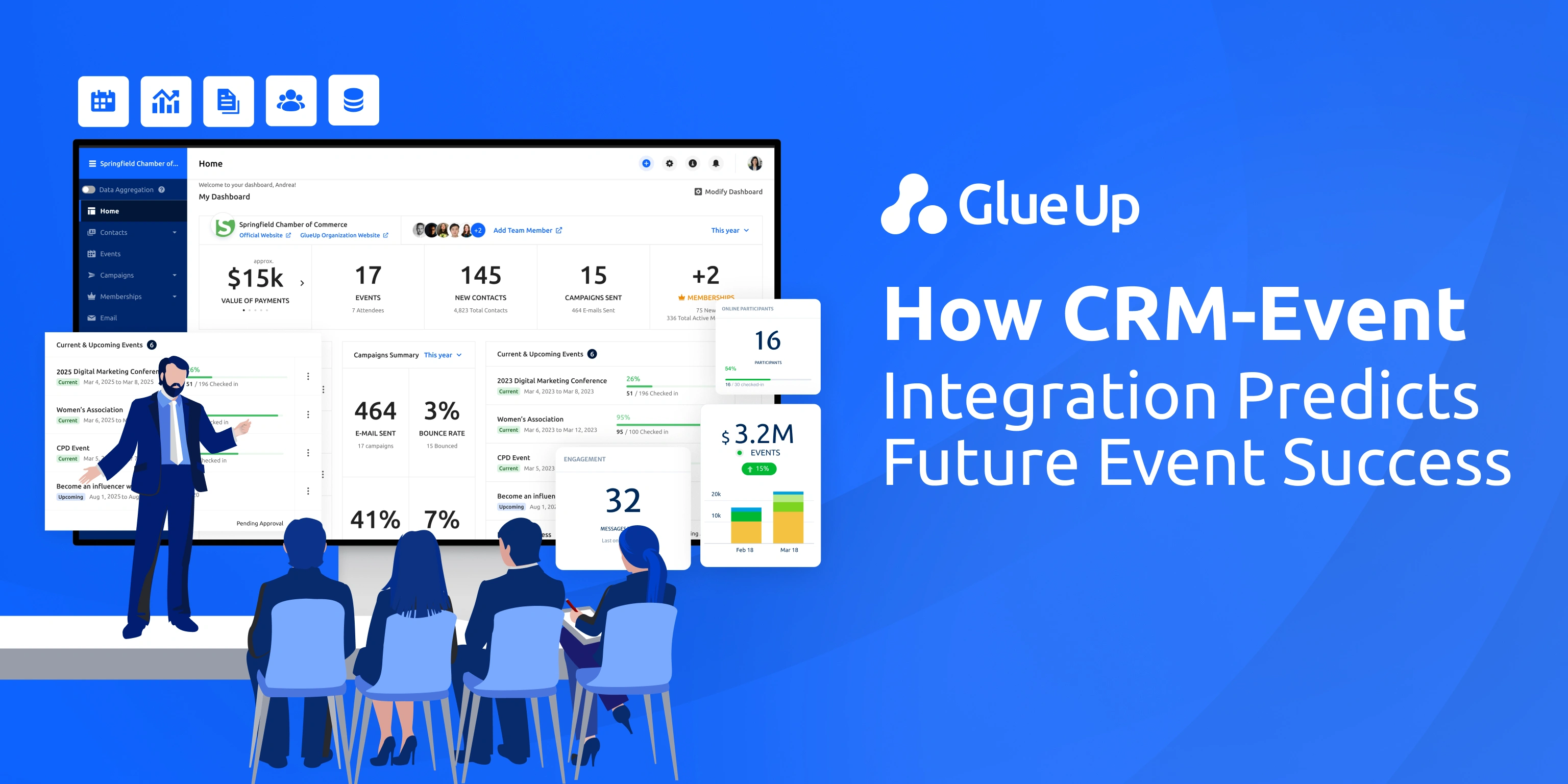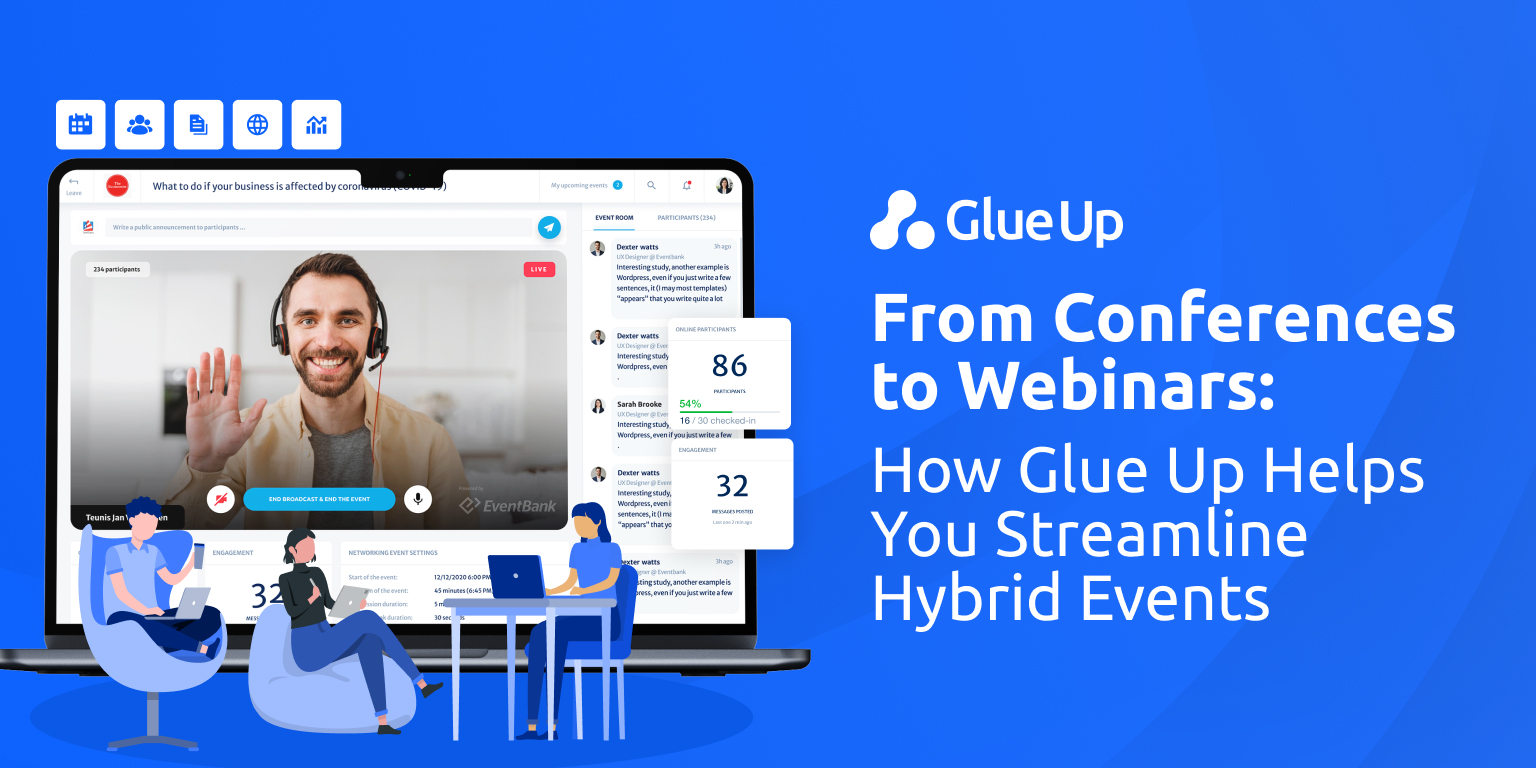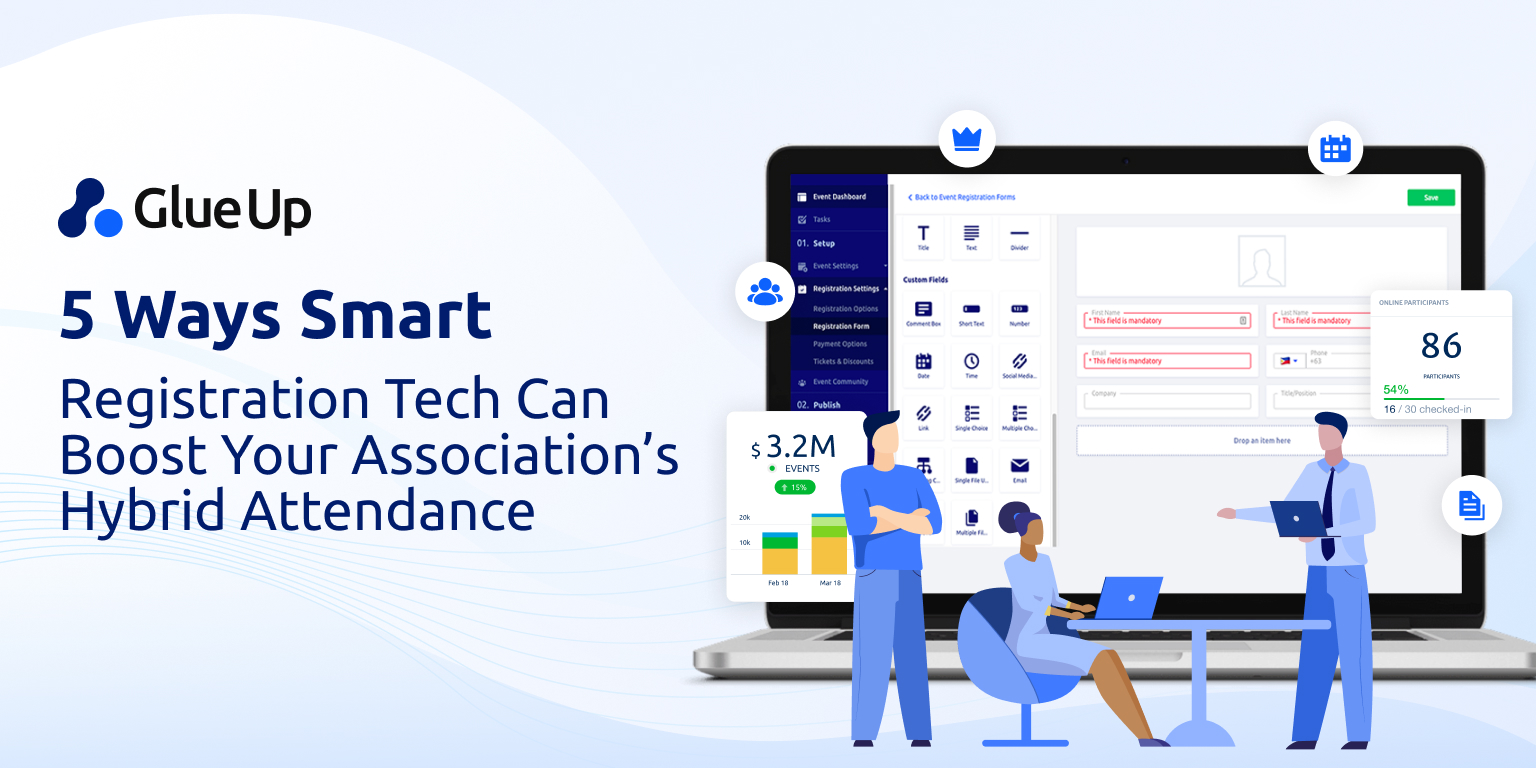
Research from McKinsey shows that organizations integrating data across functions improve forecasting accuracy by up to 20%. For associations, that's the difference between estimating outcomes and predicting them. Most still analyze events after they happen instead of using integrated systems to anticipate success. That's where CRM event integration changes the equation.
By connecting member, attendee, and financial data in real time, you gain predictive visibility into engagement, ROI, and attendance trends.
Glue Up's event management software makes that possible by linking CRM intelligence and analytics into a single, connected platform.
Book a quick demo to see how integrated data makes future performance measurable, or read on to understand why integration defines the future of event management before proceeding further.
Key Takeaways
- CRM event integration transforms event management from operational tracking to predictive forecasting.
- Unified CRM and event data reveal actionable trends in attendance, engagement, and ROI.
- Predictive analytics help associations forecast outcomes and optimize campaigns before launch.
- Glue Up's event management software consolidates CRM, finance, and reporting into one intelligent ecosystem.
- Real-time dashboards turn analytics into foresight, guiding data-driven decision-making across the event lifecycle.
- Measurable ROI and connected workflows create sustainable, repeatable event success.
Why CRM Integration Defines the Future of Event Management
No modern event manager or executive is a stranger to event data: registration records, attendee engagement, sponsor interactions, and post-event feedback. The problem is that most of it remains unstructured. When your CRM and event management system operate separately, insights that could predict performance never materialize. You see what happened, but not why it happened or what will happen next.
That's the value of CRM event integration. It consolidates fragmented data into a single intelligence layer, revealing patterns across your event lifecycle. With every registration, participation metric, and transaction synced in real time, you can quantify relationships between engagement, retention, and revenue. The outcome is operational foresight — a clear, data-backed picture of what drives event ROI.
As noted in industry research on CRM-enabled events, businesses (or associations in this context) that connect CRM systems with event software report up to 30% faster reporting turnaround and stronger correlation between participation and sales pipeline activity. The result is strategic agility, not just better data.
You make faster, smarter decisions grounded in evidence, not assumptions.
Predictive Analytics and the Shift from Reporting to Anticipation
Traditional event management stops at reporting. You measure attendance, satisfaction, and cost-per-lead after the event ends. Predictive analytics, powered by CRM integration, shifts this model entirely. Instead of waiting for outcomes, you can forecast them.
Through CRM predictive modeling, your system analyzes behavioral data like registration pace, engagement levels, and payment timing, and uses it to project future outcomes. You can estimate attendance, identify drop-off risks, and anticipate sponsorship performance weeks before the event begins. According to research on predictive CRM analytics, data-driven forecasting increases conversion accuracy by up to 25% compared to retrospective analysis.
This evolution turns your event strategy from reactive to preemptive. Imagine being able to identify underperforming sessions in advance or reallocating marketing resources to maximize turnout. Predictive analytics makes every adjustment proactive, not corrective.
When integrated into your event management CRM, these insights don't just describe performance — they define it. And the organizations that master anticipation over analysis will lead the next era of event intelligence.
How Integrated Data Enhances Event ROI Forecasting
The ability to predict success begins with how you interpret your data. Integration between CRM and event management systems provides associations with a unified foundation for event forecasting, moving beyond attendance metrics toward predictive behavioral modeling.
From Data Silos to Decision Systems
When CRM and event systems operate independently, valuable insights remain trapped. You can see how many are registered, but not which members are most likely to convert into sponsors or repeat attendees. Once you integrate both systems, that separation disappears. Every interaction, from form submissions to sponsorship transactions, becomes part of a single data ecosystem.
This ecosystem allows you to track longitudinal member behavior and establish predictive event ROI models that map engagement trends over multiple cycles. Over time, patterns like early registration velocity or session rewatch rates start to reveal high-confidence signals for future outcomes.
Turning Correlation Into Prediction
Data correlation explains what happened. Prediction tells you what to do next. Using AI event planning analytics, associations can now run simulations that assign probability values to different event scenarios. For example, by analyzing pre-event registration pace and content interest, the system can estimate attendance within a specific confidence range.
Research on AI-driven event forecasting shows that predictive systems using machine learning achieve up to 40% higher accuracy in forecasting event turnout than traditional historical trend models. That accuracy matters because it reshapes planning decisions — from speaker selection to sponsor pricing — before costs are committed.
Real-Time Feedback Loops
Integration also makes forecasting iterative. Each campaign, click, or RSVP refines the next prediction. CRM-integrated dashboards act as live feedback systems, not static reports. When attendee sentiment or registration activity deviates from expectation, predictive triggers alert your team in real time, allowing you to recalibrate marketing or content instantly.
This shift from post-event analysis to real-time prediction isn't a luxury; it's becoming an operational standard. In an environment where member attention is finite, the ability to anticipate behavior defines your competitive advantage.
How Glue Up Puts Predictive Insight into Practice
Glue Up operationalizes everything you've just read. Our AI-powered event management software connects CRM data, engagement analytics, and financial reporting into a predictive intelligence layer that makes outcomes measurable before events even begin.
Unified CRM and Event Architecture
Within Glue Up's association CRM, every member interaction — registration, payment, or attendance — syncs automatically with event analytics. This architecture allows teams to evaluate relationships between behavior, communication, and ROI within a single dashboard. It's not just unified data; it's contextual intelligence designed for proactive decision-making.
Forecasting Attendance and Engagement
Glue Up's AI Copilot identifies attendance probability based on engagement patterns, survey responses, and past participation. These insights help you forecast turnout, predict sponsor performance, and identify at-risk segments before campaigns underperform. With predictive tagging, your team can target high-value attendees while adjusting content or pricing to optimize participation.
Measuring ROI with Precision
Financial integration ensures that every event metric ties back to the balance sheet. The system tracks registrations, payments, and sponsorship revenue in real time, feeding directly into dashboards that calculate event ROI, cost-per-attendee, and engagement conversion rates. This creates a closed-loop process: data informs prediction, prediction informs action, and action informs strategy.
Scaling Insight Across the Organization
Because Glue Up's ecosystem spans CRM, events, finance, and community, predictive data doesn't remain isolated within a single department. Leadership gains unified visibility into how events drive renewals, member satisfaction, and sponsor retention. That transparency turns analytics from a reporting function into a strategic discipline.
With Glue Up, predictive event management is structural, not theoretical. The result is not just accurate forecasting but institutional intelligence that compounds with every event you run.
Book a quick demo today to see how our all-in-one event software helps associations move from event reporting to event prediction, and turn every data point into an advantage.
Frequently Asked Questions
What is CRM event integration?
It's the process of connecting your CRM and event management platforms to unify registration, engagement, and financial data for predictive insights.
How does CRM integration improve event success?
Integrated systems create visibility across every interaction — from registration to post-event revenue, allowing teams to predict outcomes and act proactively.
Can CRM data really forecast future event ROI?
Yes. Analyzing participation, conversion, and engagement data enables you to model trends that signal likely performance, turnout, and sponsorship value.
What metrics are most useful for event forecasting?
Attendance velocity, registration conversion rate, engagement depth, and cost per attendee provide the strongest indicators of event ROI.
How does Glue Up support CRM event integration?
Glue Up connects its CRM, Events, and Finance Modules to automate data flow, track ROI, and provide real-time dashboards for decision-making.
Does Glue Up offer predictive analytics features?
Glue Up's reporting and analytics dashboards deliver measurable visibility into attendance and ROI while its integrated ecosystem enables predictive, data-informed planning.
Why should associations invest in CRM event integration now?
Because forecasting, personalization, and unified reporting are becoming operational imperatives — not competitive advantages — in the event economy of 2026.
Quick Reads
- How to Build a Revenue Engine with Association Management Software
- Add-On Cart for Member Retention & Growth
- Simplify Multi-Currency Payment Posting for Community Chapters With Glue Up + Paygage
- AI Automation for Event Registration & Beyond
- Integrating AI into CRM for Membership Growth
- How to Build a Chapter Event Calendar
- What Is All-In-One Association Software?
- AI-Powered Member Check-In Software



